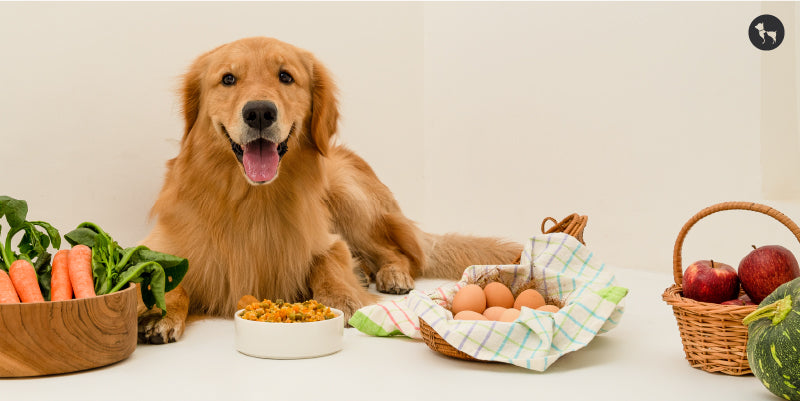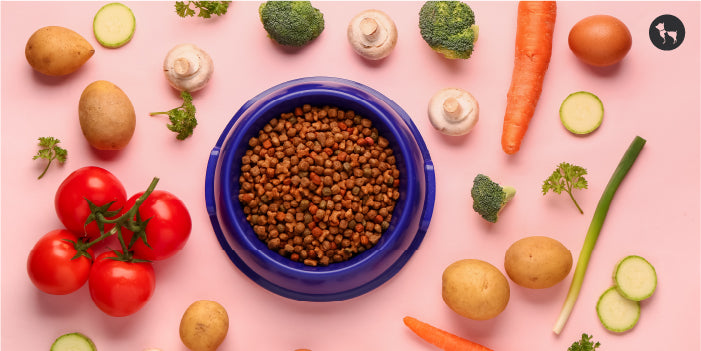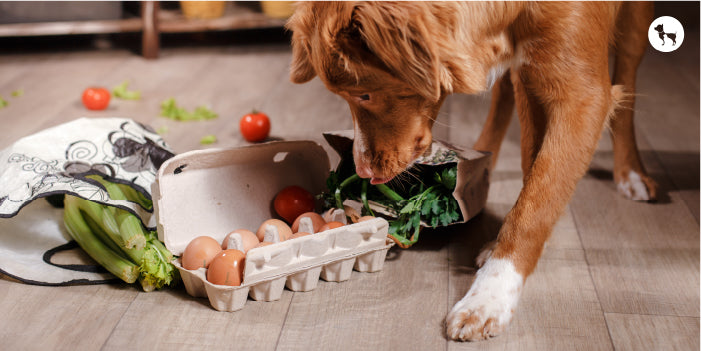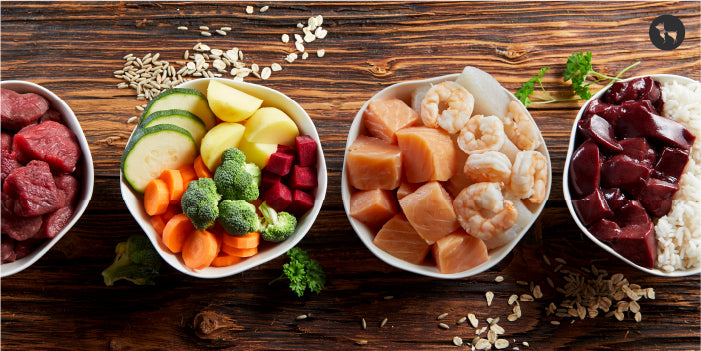

Ayurveda, the ancient Indian medicine, has something really interesting to say about food. It says that when a meal is enjoyed according to our physiological needs, it functions as a medicine by harmonising our metabolism with our vitality - the spirit of life.
That got us thinking - why are we so far removed from our roots that teaches us so eloquently about living a healthy, beautiful life? And why should we not extend this knowledge to our furry family’s diet as well? Although our pets are a different species than us, they have nestled a home in our hearts and look up to us to provide for them.
Gastrointestinal infections and dog food allergies are as common as a house fly, buzzing around demanding our attention and making our dogs live an uncomfortable life with gut issues. Which brings us to the topic of a balanced diet for dogs - a healthy mix of essential nutrients our dogs need to thrive.
In this guide, we’ll explore the foundations of how a healthy dog diet contributes to the longevity of our dogs and help you make informed decisions about their nutrition. So let’s dig deeper and take a look at a dog diet that makes for optimal dog gut health.
|
Table Of Contents:- 1.Understanding ‘Thali’ For Our Dogs 2.The Big Question - Selecting The Right Pet Food 3.Same Food Everyday? Food Rotation Is Important! |

A traditional Indian ‘thali’ is the perfect healthy, balanced meal that fills us with all essential nutrients - proteins, carbohydrates, fibre, minerals, and antioxidants. And if you use the same analogy for our pets, a balanced dog diet should include:

As we’ve talked about it in our other blog, with time you can find the right fit for your dog’s meal with some trial and error. But before you do that, it’s important to have your basics right. Here are some guiding questions that can help you make an informed decision while selecting healthy dog food:
As a puppy grows older into an adult, their nutritional needs change. When they reach ‘old age’, the diet alters as well. Always opt for age-appropriate diets, as mentioned on the packaging.
Till now, dog kibble or home-made foods have been the only two options for pet parents. But what if there was a third option that gave you a home-styled meal without even cooking? Fresh food for dogs is a new alternative that one can think about adding to their dog’s diet
Talk to your vet and understand if your dog suffers from any chronic illnesses or allergies. It’s important for a pet parent to be aware so they can choose a diet that’s suitable to their dog’s needs.
Trust us, it’s a bit tricky at first but it’s not rocket-science. You want to look for the ingredients list, guaranteed analysis and feeding instructions. You can learn more about it here.
Read More: Understanding Fresh Dog Food

Imagine if your pet was living in the wild, what are the chances that they choose the same prey to hunt everyday? Or if you were asked to have the same food everyday! Wouldn’t that be one boring life?
Food rotation has its own benefits and for our dogs, it means an important sensory delight. It is also extremely important for a dog’s gut health. By offering a variety of proteins, we ensure our dogs have a diverse nutrient intake. This can help prevent allergies and sensitivities over time. You can give small amounts of pet-safe fruits and vegetables as dog treats to provide additional nutritional benefits.
HUFT Tip: Food rotation should be done slowly. Before changing your dog’s meal, consult your vet for guidance.

A healthy meal is just one way of ensuring your dog has good gut health. Here are 5 ways you can make their tummy happier!
Probiotics have proven to maintain a harmonious balance of gut bacteria, promoting not only robust digestion but also fortifying your dog’s immune system. So the next time you’re picking a dog treat or dog food, choose one that contains probiotics.
We’re sure you must have heard this multiple times but it’s still as important. While kibble is a staple, consider including high-protein wet food into your dog’s diet for a delightful change and hydration. Prioritise options with high-quality ingredients, steering clear of dog wet food brands that use additives and fillers.
Packed fresh food for dogs is a wholesome alternative to home-made food. Our very own Sara’s Wholesome Meals are convenient and most importantly are recipes created by dog nutrition experts. A complete meal in itself, these are balanced ready-to-eat fresh dog food that offers optimal protein content.
Supplements shouldn’t be added to your dog’s diet if there’s hardly any thought put behind them. Ask your vet if your dog does need supplements and if the answer is yes, then choose them wisely. Our HUFT Sardine Oil and HUFT Cold Pressed Hemp Seed Oil are 100% natural and are made with human-grade ingredients. They’re rich in Omega 3 fatty acids like EPA and DHA which strengthens immunity and keeps the heart healthy. The only difference between them is that one’s made of fish and the other is vegan!
Believe it or not, our dog’s mental health does affect their physical health as well. Stress can lead to digestive issues, so providing a stable and comfortable environment for your dog is essential. Whether its daily walks, playtime or simple cuddles, ensuring your dog feels loved and secure contributes to a healthy gut and overall well-being.
We can’t stress how important it is to have a good vet for your dog’s health. Regularly communicate with them and a canine behaviour specialist to understand your dog’s psycho-immunology. By understanding their nutritional needs, choosing the right dog food that fits their special needs and getting them plenty of exercise, you can nurture a joyful life for your pets!
Isn’t the answer a bit obvious? Health is the essence of life and a good, nutritious balanced diet is the building blocks for health, even our dogs’. Most dogs today suffer from a bad gut and a major reason is what we’re putting in their bowls. As responsible pet parents, it is our duty to provide our dogs with the best meal, each time.
Bad gut health can mean vomiting, diarrhoea, constipation, loss of appetite, loss of hair, skin allergies, lack of energy, sudden weight gain and loss, amongst other signs. Diet plays an important role in addressing and resolving such gastrointestinal issues. A nutrient-rich, biologically appropriate diet is one of the most natural ways you can resolve them.
Well, both are great options for your dogs. The only drawback for both is that one, with homemade foods, we might miss out on what our dogs need. Taste is not nutrition, right? Second, commercial pet food bought without reading the packaging or knowing what goes inside can be troublesome. If they’re both done right, both forms can be given to your dog for a well- balanced diet. If you wish, you can also opt for fresh packaged foods made by nutrition experts. These are biologically appropriate, tasty and are pre-made so all you’ve got to do is serve! Remember, while purchasing fresh packaged dog food, read up on the ingredients and what goes inside them. Do your research well.
All dogs are different and hence one diet plan for all won’t be the right way to approach this, won’t it? Don’t we all feel hunger differently? Similarly, so do our dogs. You can carve a meal plan that suits your schedule and your dogs’ but what’s more important is what you feed them. Regular exercise on a daily basis is extremely necessary for an optimal gut health.
Why not! Probiotics, as we said above, have proven to maintain a balance of gut bacteria that promotes digestion but are also great for your furry one’s immune system. But you don’t need to necessarily buy supplements if you don’t wish to. Simply choose dog treats or dog food that contains probiotics. If you wish to make food at home, vegetables like broccoli, carrots, spinach, kale or cauliflower contain probiotics and are safe for dogs to eat.
The list is commonly known amongst pet parents but just to refresh, stay away from foods that are toxic to dogs. These include chocolate, onion, garlic, grapes, raisins, caffeine, human peanut butter (dog peanut butters are safe and dairy products for dogs who are lactose intolerant.
Our wise grandmothers were not wrong when they said that everything in our bodies is interconnected. Research suggests that imbalance of the gut microbiota may contribute to obesity-related issues. On the flip side, excess body weight, especially tummy fat, is associated with chronic low-grade inflammation. This inflammation can affect the gut lining, potentially contributing to gastrointestinal problems.
Each dog is different and hence looking for a one-fit solution on the internet will be a disservice to our wonderful creatures. There are plenty of gut health supplements available for pets in the market but ideally they should only be considered if your trusted vet recommends.
Transitioning to a new diet (food rotation) is extremely important for our dog’s gut health as eating the same foods over a long period of time can cause food allergies to develop easily. While transitioning, remember to go slow and gradually over the 7-10 days at a minimum. Start by mixing a small amount of new food in the current one and then gradually increase the proportion of the new diet. Monitor your pet for signs of digestive distress such as vomiting, diarrhoea, lethargy or change in appetite. If the symptoms persist, switch to the previous food and consult your vet at the earliest. Give them plenty of water and if possible, give them probiotic-rich treats or homemade foods.